3 Mins Read
Barcelona’s Novameat, which focuses on plant-based whole cut meats, has announced the closing of a successful pre-Series A funding round, with $6 million raised in a round led by Praesidium. In addition, Unovis Asset Management, Rubio Impact Ventures and Volta Circle participated, amongst others. Funding has been allocated to the development of proprietary technology that will allow for scaled commercial production. In the announcement, Novameat shared that it has won a grant from the European Innovation Council Accelerator.
Novameat is looking to build on its reputation for realistic plant-based meat developments. In 2020, the startup unveiled what it claimed to be “the most realistic plant-based steak” The product was a 3D printed pea protein whole cut, blended with other ingredients for a juicy and textured substitute to conventional beef.

Building on a solid start
With optimistic reception for its steak, Novameat has continued on to develop and improve its initial meat prototype. The evolution of technology was an initial focus, with microextrusion taking the place of 3D printing. The company claims that this allowed for a better texture, alongside improved cooking performance. Proprietary equipment and technology have been patented.
The company is now looking to scale on an industrial level, to produce more than 500 kilos of plant-based meat every hour. “The current production speed is about 15 times faster than the typical high-moisture extrusion technology widely used in the alternative proteins sector,” Giuseppe Scionti, CEO at Novameat told Forbes.
Earlier this year, Novameat demonstrated its capabilities by debuting an unlikely prototype. A fully plant-based blue steak, made from all five kingdoms of living things. It was a demonstration of things to come, with sensitive ingredients carefully managed and manipulated to create an edible end product. New funding has been cited as being earmarked for developing steaks and tenderloins for market release.
Catering to a developing market
“We have had exciting results and we feel very confident with our products,” said Scionti, to Forbes. Novameat has focussed its efforts on replicating beef, chicken and pork. Other varieties are being investigated for viability and in accordance with demand. Products are predicted to be available this year, with domestic restaurants providing testing and feedback. By next year, the company hopes to be in a position to launch in a retail capacity.
“Whilst society needs to dramatically lower its meat consumption, we find it very hard to let go of our beloved steak, chop or fillet,” Tijl Hoefnagels, vice president at the Dutch Rubio Impact Ventures said in a statement. “On this segment we’re lacking credible alternatives to further propel the transition to a more plant-based diet. Novameat’s team has the skills to bring these to our plate.”

3D printed meat of the future
Novameat might be leaning towards microextrusion but plenty of other companies are developing 3D printed meat techniques.
It was just announced that Ikea is making 3D-printed vegan meatballs. The move is designed to attract the attention of up-and-coming sustainable tech employees.
Over in Israel, SavorEat has entered into a collaboration with hamburger chain BBB. The latter will serve especially 3D printed burgers that can be dictated and designed by the customers themselves. Fat and protein levels can be tweaked to achieve the best taste for each consumer, by using an app. They can then watch their burger being printed and cooked.
Lead photo Novameat Pork 2.0. Photo by Novameat.




